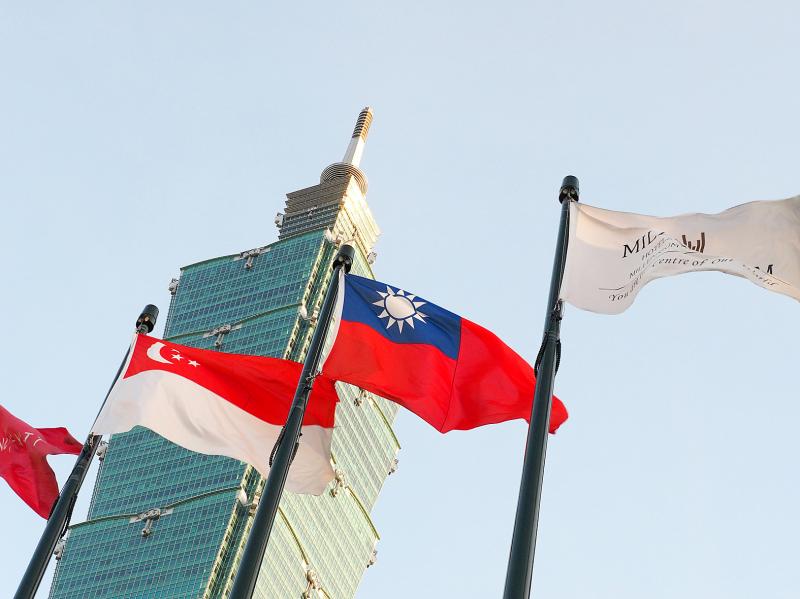Moody’s Investors Service yesterday affirmed Taiwan’s sovereign credit rating of “Aa3” and changed its credit outlook for the nation to “positive” from “stable,” the first time the ratings agency has given the nation that credit outlook since 1994.
“The decision to change the outlook to positive from stable reflects increasing signs that Taiwan’s economy is more resilient and that its governance strength is stronger than previously assessed,” Moody’s said in a statement.
The Ministry of Finance welcomed the agency’s move.

Photo: David Chang, EPA-EFE
“This is the first time Moody’s has raised its outlook for Taiwan since 1994, when it first issued its sovereign credit rating,” the ministry said in a statement.
“The positive outlook indicates that the nation’s sovereign rating may be upgraded within one year,” it said.
Taiwan’s export-oriented high-tech manufacturing sector has benefited from demand for semiconductors amid the global surge in remote working, and it is likely to boost the nation’s competitiveness in the medium term, Moody’s said.
That is because changes in people’s behavior and work practices amid the COVID-19 pandemic would continue to boost demand for Taiwan’s products, while the nation’s track record of sound policy effectiveness, aided by robust fiscal and external positions, supports its credit profile, Moody’s said.
Taiwan’s strong fiscal and external buffers would remain intact through the pandemic shock, and continue to strengthen compared with other Aa-rated peers, it said.
However, ongoing geopolitical tensions and the nation’s aging demographic would remain constraints for its credit profile going forward, it said.
Taiwan’s real GDP growth is expected to accelerate to 3.7 percent this year, from 3.1 percent last year, while its fiscal deficit to GDP is predicted to fall to 1 percent this year from an estimated 2.1 percent last year, which Moody’s said is considerably lower than the median fiscal deficit of between 3 and 5 percent of GDP for other Aa-rated economies.

When an apartment comes up for rent in Germany’s big cities, hundreds of prospective tenants often queue down the street to view it, but the acute shortage of affordable housing is getting scant attention ahead of today’s snap general election. “Housing is one of the main problems for people, but nobody talks about it, nobody takes it seriously,” said Andreas Ibel, president of Build Europe, an association representing housing developers. Migration and the sluggish economy top the list of voters’ concerns, but analysts say housing policy fails to break through as returns on investment take time to register, making the

‘SILVER LINING’: Although the news caused TSMC to fall on the local market, an analyst said that as tariffs are not set to go into effect until April, there is still time for negotiations US President Donald Trump on Tuesday said that he would likely impose tariffs on semiconductor, automobile and pharmaceutical imports of about 25 percent, with an announcement coming as soon as April 2 in a move that would represent a dramatic widening of the US leader’s trade war. “I probably will tell you that on April 2, but it’ll be in the neighborhood of 25 percent,” Trump told reporters at his Mar-a-Lago club when asked about his plan for auto tariffs. Asked about similar levies on pharmaceutical drugs and semiconductors, the president said that “it’ll be 25 percent and higher, and it’ll

NOT TO WORRY: Some people are concerned funds might continue moving out of the country, but the central bank said financial account outflows are not unusual in Taiwan Taiwan’s outbound investments hit a new high last year due to investments made by contract chipmaker Taiwan Semiconductor Manufacturing Co (TSMC, 台積電) and other major manufacturers to boost global expansion, the central bank said on Thursday. The net increase in outbound investments last year reached a record US$21.05 billion, while the net increase in outbound investments by Taiwanese residents reached a record US$31.98 billion, central bank data showed. Chen Fei-wen (陳斐紋), deputy director of the central bank’s Department of Economic Research, said the increase was largely due to TSMC’s efforts to expand production in the US and Japan. Investments by Vanguard International

WARNING SHOT: The US president has threatened to impose 25 percent tariffs on all imported vehicles, and similar or higher duties on pharmaceuticals and semiconductors US President Donald Trump on Wednesday suggested that a trade deal with China was “possible” — a key target in the US leader’s tariffs policy. The US in 2020 had already agreed to “a great trade deal with China” and a new deal was “possible,” Trump said. Trump said he expected Chinese President Xi Jinping (習近平) to visit the US, without giving a timeline for his trip. Trump also said that he was talking to China about TikTok, as the US seeks to broker a sale of the popular app owned by Chinese firm ByteDance Ltd (字節跳動). Trump last week said that he had